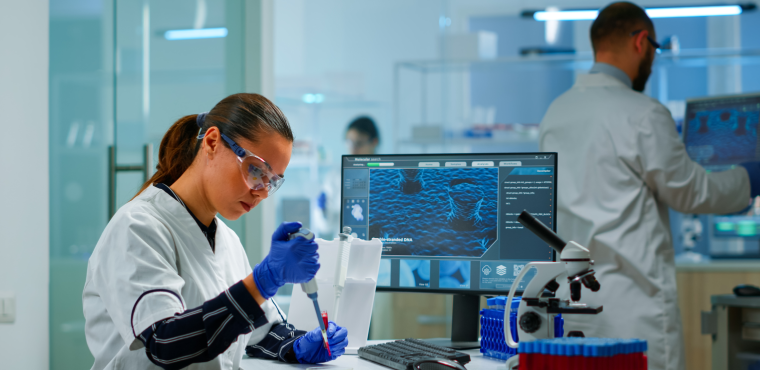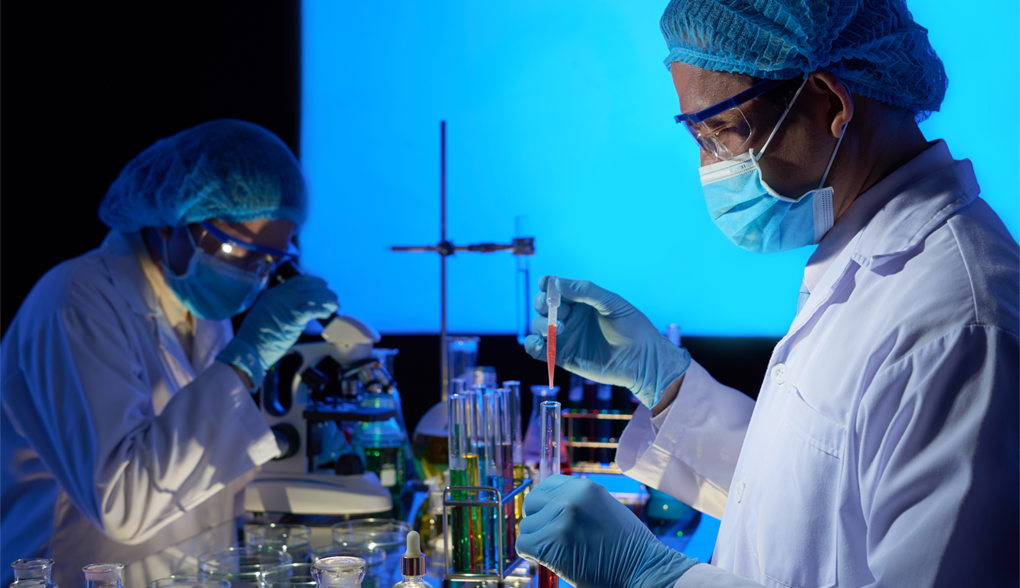Blood Bank
- Patient Pretransfusion Testing
- ABO cell and serum grouping
- Rh slide and tube grouping
- Antibody Detection
- Incompatibility testing
- Processing of blood received from another facility (confirm ABO and Rh type of units from a segment)
- Storage of blood and components
- Tranfusion service
- Rh Immune Globulin Candidacy studies
- Antibody Identification
- Therapeutic phlebotomy
- Storage of tissue components
Chemistry
The Chemistry section does most routine chemistry analysis and refers other to LabCorp Laboratories.
- Acetaminophen
- Alanine Aminotransferase (GPT)
- Albumin
- Alcohol, Ethyl (non-legal)
- Amylase
- Ammonia
- Aspartate Aminotransferase (GOT)
- B12, Vitamin
- Beta HCG
- Bilirubin – Direct
- Bilirubin – Neonatal
- Bilirubin – Total
- Blood Urea Nitrogen
- G-Type Natriuretic Peptide (BNP)
- Calcium
- Calcium, Ionized
- Carbon Dioxide
- Chloride
- Cholesterol
- Cholesterol – HDL
- C-Reactive Protein, High Sensitive
- Creatinine kinase (CK) – Total
- Creatinine Kinase – MB Fraction
- Creatinine
- Creatinine Clearance
- Digoxin
- Drug of Abuse Screens
- Ferritin
- Folate
- Gentamycin
- Glomerular Filtrate, estimate
- Glucose
- Glucose Tolerance
- Glutamyl transferase (GT)
- Hemoglobin A-1 C
- Iron
- Lactic Dehydrogenase (LDH)
- Lipase
- Magnesium
- Methemoglobin
- Microalbumin
- Myoglobin
- Phosphorous (Phosphate)
- Phonobarital
- Phenytoin (Dilantin)
- Potassium
- PSA Total
- PSA Tree
- PTH-Intact
- Saliculate
- Sodium
- T3
- T3 Free
- T4
- T4 Free
- Tegretol
- Theophyline
- TIBC
- Tobramycin
- Total Protein
- Transferrin
- Trigyceride
- Troponin I
- TSH
- Uric Acid
- Valproic Acid
- Vancomycin
Arterial Blood Gases which include:
- pH
- HCO3
- Sat
- pCO2
- TCO2
- Hgb
- pO2
- ABE
- Carboxy Hgb
*Test ordered on specimens that have not been approved for use as a specimen in the individual procedure will be done with the notation made of the request that “no normal range studies have been conducted for (specimen and test concern) using this methodology.” For example: No normal range studies have been conducted for synovial fluid LDH using this methodology.
Cytology
- Routine non-genital cytology smears
Hematology
- Anemia Profile
- Bleeding Time (IVY)
- Body Fluid Analysis – cell count and crystal analysis
- Bone Marrow
- Complete Blood Count
- D-Dimer
- Eosinophil Count
- Factor Xa Activity (Heparin)
- Fibrinogen Partial Thromboplastin Time (PTT)
- Platelet Count and Estimate
- Platelet Function – Aspirin and Plavix
- Pre Operative Coagulopathy Work-Up
- Prothrombin Time
- Reticulocyte Count
- Sed. Rate Westergren
- Sickledex
- Thrombo-Wellcome Test FDP
Histology
- Routine H & E staining.
- Special stains except those being referred for consultative services.
- IHC stains
- Gross pathologic review.
- Frozen section review.
- Microscopic examination of slides by pathologist.
- Serves as a Reference Laboratory for local physician’s offices, Gadsden Endoscopy, and Gadsden Surgery Center.

Microbiology
- Routine Cultures (aerobic and anaerobic)
- Campylobacter Cultures
- Yersenia Cultures
- E. Coli O157 Cultures
- Vibrio
- GC Cultures
- Mycobacteria Cultures
- Fungus Cultures
- Gram Stains
- Acid-Fast Stains
- Methylene Blue Stain for Fecal WBCs
- Fat Stain
- Wet Prep
- Eosin Smear – Nasal, Sputum
- CloTest – Urease Test for H. pylori
- India Ink Prep
- KOH Prep
- Occult Blood – Gastric, Fecal
- Strep Screen- Group A
- Clostridium difficile Toxin by PCR
Point of Care Testing
- Whole Blood Glucose
- Rapid Strep
- Urine HCG
- Urine Macroscopic (dipstick)
- pH
- pO2
- pCO2
- Na
- K
- Cl
- iCa
- TCO2
- BUN
- Glucose
- Creatinine
- HCT
- ACT
- INR (PT)
- Rapid Drug Screen
- Saliva Ethanol Fecal Occult Blood (physician only)
- CK-MB
- Troponin
- Myoglobin
- BNP
- D-Dimer
- Whole Blood Glucose
- Lactic Acid

Reference Testing
- Laboratory testing not offered in-house will be sent to LabCorp. Orders and Results are transmitted via a HL7 interface between the SoftLab and LabCorp.
- Occasionally, some specialized testing may also be sent to Mayo Laboratories or Quest Laboratories.
- Some specialized Microbiology and Virology testing is sent to the State Health Department such West Nile Virus.
- Gynecology Cytology is also sent to LabCorp.
- Bone Marrow Processing and Examination is performed by Integrated Oncology as ordered by Physician.
- Pathology referrals are sent to Integrated Oncology for testing and consultations
- During instrument breakdowns, samples maybe sent to LabCorp or Gadsden Regional Medical Center for testing depending on required turn-around.
Serology
- ANA
- ASO
- Bacterial Antigens – CSF, Blood, and Urine
- Cryptococcal Antigen – CSF
- H. pylori
- Mono Test
- MRSA by PCR
- Mycoplasma pneumoniae
- Rheumatoid Factor – RA Latex
- RPR – qualitative and quantitative
- Rubella
- Rubeola
- Staph aureus by PCR
- Varicella Zoster

Urinalysis
Macroscopic Examination of urine
1. Color
2. Appearance
3. Specific gravity
4. pH
5. Albumin
6. Glucose
7. Ketone Bodies
8. Occult Blood
9. Urobilinogen
10. Leukocyte
11. Nitrite
12. Reducing Substance: This test is performed by a Clinitest tablet on all pediatric specimens from children up to 10 years of age.
Microscopic Examination of urine sediment
1. RBC/hpf
2. WBC/hpf
3. Cast/lpf
4. Epithelial Cells
5. Mucous Threads
6. Bacteria
7. Budding Yeast
8. Crystals
9. Amorphous Material
10. Trichomonas
Collection of urine with instructions and directions for 24 hour collections
Fat droplets in urine, examination for
Urine Pregnancy Test
Refractile Bodies in urine, examination of
Turnaround and Testing Policy
It is the policy of this laboratory to make every effort to report all test results in a timely manner.
A. Generally, all in-house testing should be collected according to the following schedule:
1. STATs – within 30 minutes of order being placed in the computer
2. ER STATs – within 10 minutes of order being placed in the computer
3. Timed – within 30 minutes either side of time needed
4. Routine – within 4 hours on order day
5. Early AM Routine – 4 am till 6:30 am
B. Generally, all in-house testing should be completed according to the following schedule:
1. STATs – within 1 hour of receipt of specimen in lab
2. ER STATs – within 35 minutes of receipt of specimen in lab
3. Timed – within 2 hours of receipt of specimen in lab
4. Routine – within 4 hours of receipt of specimen in lab
5. Early AM Routine – by 7:00 am
C. The following tests are exempt from the schedule and will take longer to process. The laboratory may be contacted for specific details.
1. ANA
2. Anemia Profile
3. ASO
4. B12
5. Bone Marrows
6. Chlamydia
7. Clostridium difficile Toxin
8. Cortisol
9. Ferritin
10. Folate
11. Hemoglobin A1C
12. HIV Suds Test
13. Iron and TIBC
14. Microbiology Cultures and Smears
15. Reference Tests
16. RF
17. RPR
18. Thyroid testing
D. Delays:
The laboratory will notify the ward/clinic of any unusual delays in reporting of tests. Example: instrument malfunctions, power failures, etc.
Featured Services

Cardiology
Emergency Services
Orthopedics

Diagnostic Imaging
Senior Heights Behavioral Healthcare Unit



